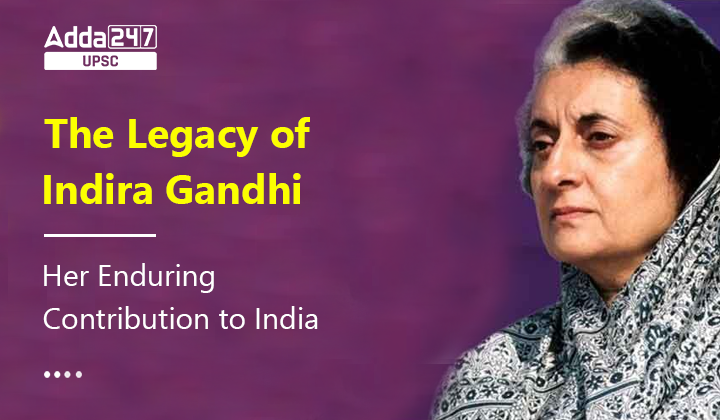Table of Contents
Indira Gandhi, one of India’s most iconic leaders, left an indelible mark on the nation’s history and politics. As the first female Prime Minister of India, she played a pivotal role in shaping the country’s destiny. Her contributions, though often debated and scrutinized, have had a lasting impact on India’s socio-political landscape. This article explores the multifaceted contributions of Indira Gandhi, spanning from her leadership during challenging times to her significant policy initiatives.
Leadership during a Crucial Era
- Indira Gandhi’s leadership came to the fore during a period of great turmoil. She served as Prime Minister during a time when India was grappling with both domestic and international challenges.
- Her resolute decision-making and unwavering commitment to India’s sovereignty became her hallmark.
- One of the defining moments of her leadership was her handling of the 1971 Indo-Pak war, which resulted in the creation of Bangladesh.
- Her astute diplomacy and decisive military action showcased her ability to protect India’s interests and secure justice for a neighboring nation.
Garibi Hatao (Eradicate Poverty) Campaign
- Indira Gandhi’s political slogan, “Garibi Hatao,” or “Eradicate Poverty,” was not just a catchy phrase but a commitment to improving the lives of millions of underprivileged Indians.
- She implemented a series of pro-poor policies and welfare programs, including land reforms, rural development initiatives, and expansion of the public distribution system. These policies aimed to uplift the marginalized sections of society and reduce poverty.
Nationalization of Banks
- One of the most significant economic reforms during her tenure was the nationalization of banks in 1969. This bold move aimed to bring financial services to the masses and reduce the concentration of wealth in the hands of a few.
- Nationalized banks played a crucial role in expanding access to credit and fostering economic growth in India.
Green Revolution
- Indira Gandhi’s government actively supported the Green Revolution, which transformed India’s agriculture sector. Through the introduction of high-yielding crop varieties, modern farming techniques, and improved irrigation, this initiative boosted agricultural productivity.
- It not only made India self-sufficient in food production but also reduced hunger and poverty in rural areas.
Empowerment of Women
- Indira Gandhi was a trailblazer for women in Indian politics. As the first female Prime Minister, she broke gender barriers in a male-dominated field.
- Her leadership inspired a generation of women to actively participate in politics and various other fields. She championed the cause of women’s rights and promoted policies aimed at their empowerment.
Strengthening India’s Defense
- During her tenure, Indira Gandhi took significant steps to enhance India’s defense capabilities. She initiated the development of India’s nuclear program, positioning the country as a nuclear-capable nation.
- Her focus on strengthening the military was driven by the need to safeguard India’s security in a volatile region.
Centralization of Power
- Indira Gandhi’s leadership was not without controversy. Her declaration of a state of emergency in 1975, which led to the suspension of civil liberties and a centralized government, remains a contentious issue.
- While her intentions were to maintain political stability and address rising corruption, this period marked a significant challenge to democratic principles.
Indira Gandhi’s Diplomatic Legacy: India’s Bilateral Relations on the Global Stage
Indira Gandhi’s era was marked by a dynamic and multifaceted approach to bilateral relations. India’s foreign policy under her leadership focused on securing its national interests while balancing the nation’s role in the global arena. The relationships she fostered with countries like the Soviet Union, the United States, China, and her engagement with international forums like NAM and the India-Africa Forum Summit reflected her commitment to India’s strategic and diplomatic priorities during a period of significant geopolitical change.
Conclusion
Indira Gandhi’s contributions to India’s history and development are a complex and evolving narrative. Her leadership during challenging times, pro-poor policies, and efforts to empower women are commendable aspects of her legacy. The nationalization of banks and the Green Revolution continue to benefit the Indian economy. However, her tenure also saw the controversial centralization of power during the Emergency.
Indira Gandhi’s impact on India and its political landscape cannot be overstated. Her legacy continues to shape the country’s policies and politics, and her journey from being the daughter of Jawaharlal Nehru to the first woman Prime Minister of India is an inspiration for many. As India progresses and faces new challenges, her contributions remain an integral part of the nation’s historical tapestry.



 TSPSC Group 1 Question Paper 2024, Downl...
TSPSC Group 1 Question Paper 2024, Downl...
 TSPSC Group 1 Answer key 2024 Out, Downl...
TSPSC Group 1 Answer key 2024 Out, Downl...
 UPSC Prelims 2024 Question Paper, Downlo...
UPSC Prelims 2024 Question Paper, Downlo...





